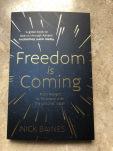I know. I nicked the title from the late great Terry Pratchett. But, I also used it in the book I published last year for Advent, Christmas and Epiphany: Freedom is Coming. The phrase just summed up a chunk of what lies behind the musings of that great prophet of the eighth century BC, Isaiah. People, he suggests, have such small ambitions – they serve such small gods.
You have to read the text to get the point, but, basically, the story goes like this. The people know themselves to be God’s people, called to a particular vocation in the world. The problem is, that – just as they had been warned before they entered the land of promise – when things go well for us, we forget who we are and where we have come from. In the case of the Israelites, they forgot that once they had been slaves and that they had begun with nothing to their name. And now they thought the world belonged to them.

So, Isaiah mocks the small gods, the tribal deities, the idols made of wood and stone. He asks why the creator of the cosmos is ditched in favour of a bit of fluff. And the question that this framing of experience, from so long ago, hangs over us today is this: why do we settle for ‘death by entertainment’ (just look at what’s on telly) or anaesthetising by endless activity when a bit of space might just open up new possibilities? Isaiah is clear that the God who brings order out of chaos, but never exempts even himself from all the world can throw at him, made us for more than this.
The relevance to now is simple. I don’t know about you, but having to spend every day in the house would not have sounded like my idea of fun a week ago. But, now, thrust upon us by the worst of circumstances, the forced isolation could become an opportunity – to not run away from the challenge to live with the exile, the emptiness, but to stick with it, live through it, and contemplate what my life is for.
Isaiah suddenly seems to sound very contemporary. His questions are for every age, not just his in Babylon. On the other hand, I could just watch telly and keep my horizons close, my ambitions manageable, my gods small.
